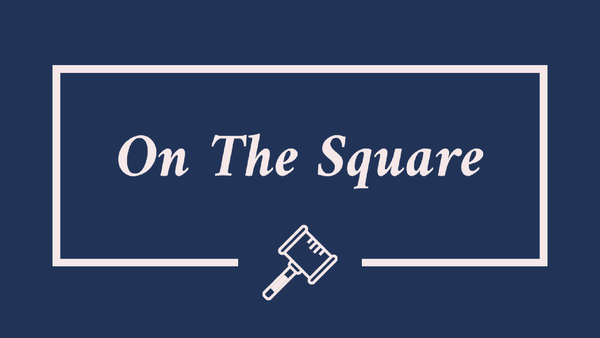Is this the true history of Masonic Christmas Cards?
Chapter 1: The Masons' Holiday Plan

In a village nestled beside a whispering forest in Ancient England, where homes and shops clustered around a central square, there lived a lodge of active masons, known for their skill and craftsmanship in stonemasonry. Among them were three Master Masons: Alin, a man of great learning; Bran, whose hands shaped the hardest stone with ease; and Crispin, whose heart was as open as the summer sky.
As the winter solstice approached, bringing with it the tradition of gift-giving, Alin proposed a grand festive board. "Let us," he declared, "display our finest works and exchange them as tokens of our brotherhood, here on the square for all to see."
Bran, ever practical, nodded. "A fine idea. My carvings of the square and compass are ready."
But Crispin remained silent, his brow furrowed with concern. "Brothers," he said softly, "many in our village, even those who dwell on the square, lack food and warm clothing. Should we not first share our bounty with them, before we exchange gifts amongst ourselves?"
Alin and Bran exchanged glances. "But our tradition," Alin protested, "is to honour our craft."
"Indeed," Bran added, "and these gifts celebrate the skill that binds us."
Chapter 2: Crispin's Quiet Kindness

Crispin did not argue. Instead, he spent the next few days carving small, simple tokens – a heart, a sheaf of wheat, a humble dwelling – each representing a blessing. On the day of the solstice, while Alin and Bran displayed their elaborate carvings and the laden festive board on the square, Crispin ventured into the village, carrying a basket of food from the intended feast.
He offered his simple tokens and sustenance to the families shivering in the cold, sharing what little food he had set aside. To a widow, he gave a carving of a heart and some bread, whispering, "May you always feel love's warmth." To a starving farmer, he presented the sheaf of wheat and some roasted meat, saying, "May your fields be blessed with abundance." To a homeless child, he offered the carving of a dwelling and a sweet cake, saying, "May you find shelter and peace, even here on the square."
Chapter 3: The Happiest Gift of All

When Crispin returned to the lodge, Alin and Bran greeted him with surprise. "Where are your carvings, brother?" Alin asked. "We have admired each other's work, but you have brought nothing."
Crispin smiled. "My gifts are given," he said. "I have found greater joy in sharing with those in need than in exchanging tokens of skill."
A silence fell upon the lodge. Then, a young orphan, whom Crispin had given a carving of a dwelling, entered, his eyes shining with gratitude. "Master Crispin," he said, "your gift brought warmth not only to my hands, but to my heart. It is the first kindness I have known in many years."
Tears welled up in Alin's eyes. Bran, too, was moved. They looked at their own carvings, once so impressive, now seeming hollow. The warmth of Crispin's actions resonated deeply within the lodge. Alin and Bran, humbled by the genuine joy they witnessed in the eyes of the villagers, understood that true craftsmanship lay not just in skill, but in the heart that guided the hands.
Chapter 4: A New Tradition of Giving

The following year, alongside their carefully crafted stone pieces, each mason prepared small, heartfelt tokens similar to Crispin's – carved wooden stars for children, woven wool for warmth, and miniature tools symbolizing hope for better work. They delivered these quietly to the homes of those in need, often accompanied by a share of their festive food.
This act of selfless giving, year after year, became an integral part of their winter celebrations. As time flowed like the nearby river, and the village grew, the masons' direct visits to every home became challenging. To ensure their spirit of goodwill continued to spread, they began to craft small, decorated cards bearing simple blessings and wishes for warmth and plenty. These cards, often adorned with masonic symbols alongside winter foliage, were left at doorsteps, a silent message of care and connection during the darkest days of the year, a time that would eventually be widely celebrated as Christmas.
The villagers, touched by these gestures, began to emulate the practice, creating their own simple cards to share with neighbours and loved ones during this emerging Christmas season. And so, the quiet generosity of the three Master Masons, particularly Crispin's selfless act, blossomed over generations, its spirit echoing in the now widespread tradition of exchanging what would become known as Christmas cards, filled with goodwill each winter season, a gentle reminder of the power of a heartfelt gift.
Chapter 5: The Heartfelt Moral of the Story
This story teaches us that the greatest gift is not the most expensive or the most skilfully made, but the one given with kindness and love. True joy comes from helping others and sharing what you have, and even a small act of kindness can start a wonderful tradition that lasts for many years.
Why not view our Masonic Christmas Cards
Send a smile this season! Our Masonic Christmas cards blend festive fun with the Craft, sending a jolly message of brotherhood and cheer. Uniquely designed specifically for UGLE Craft Masons of all provinces.
